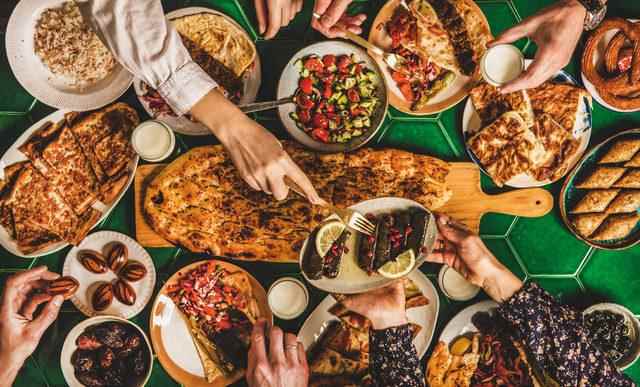In the body system, which is accustomed to eating two meals in the form of sahur and iftar in Ramadan, an easy transition can be made to normal nutrition in terms of metabolic rate and maintaining body weight.
ONLY IFTAR SLOWS METABOLISM
Noting that those who skip sahur and only have fast-breaking meals may experience problems in terms of digestion and metabolism, Dietician Özden Örkcü said, “Since their bodies are used to eating only one meal a day, if they switch to three or four meals a day, they may experience digestive problems such as nausea, sugar spikes, gas pains, constipation and gain weight. ” warned.
FOR LOTS OF WATER
Emphasizing that the best option for a smooth transition to a normal nutritional routine is to increase water consumption, Dietitian Özden Örkcü said, “The body should not be dehydrated. In order for the body to adapt to this period, foods containing all food groups (carbohydrates, fats and proteins, fruits and vegetables) should be included in the meals, attention should be paid to the amount of portions, portions should not be increased and foods should be chewed well. gave advice.

MAKE A LIGHT BREAKFAST
Noting that one of the most common mistakes made on the morning of the feast is to start the day with a high-calorie breakfast, Özden Örkcü said, “You should not start the day with a high-calorie breakfast after a long fast with a light sahur. On the morning of the feast, the excitedly anticipated breakfast can be replaced by omelet instead of fried eggs, cheese wrapped in a pancake made from whole wheat flour instead of pastry, plenty of greens and fried potatoes and vegetables can be replaced by baked vegetables.” said.

DO NOT EXCEED IN DESSERT
Referring to the desserts, which are indispensable for the holidays, Özden Örkcü said, “Desserts should not be overdone. Fruit or milk desserts should be preferred. Too much variety should be avoided. Only one or two main meals should be eaten and soft drinks should be avoided. Instead of fruit juices, water can be preferred.” said.

ATTENTION TO Caffeine Consumption
Noting that many people make a sudden change in their eating habits right after Ramadan, they behave in behaviors that will cause digestive problems and weight gain, Özden Örkcü said, “We should be very careful with our calorie intake when returning to a normal diet. Never forget that while fasting, our body reduces its ability to consume larger amounts of food and high calories, and the metabolism adjusts accordingly. Along with overeating, a common mistake is consuming high doses of caffeine, which can lead to serious health problems like dehydration. Therefore, pay attention to your water consumption and if your urine color is dark, continue your water consumption until it turns light yellow. made a suggestion.
He listed the things to be done in the transition to the normal order as follows:
- Satisfy your sweet cravings with fresh and dried fruits like dates, figs, and raisins.
- Stay active by boosting metabolism through physical activity. Find time for exercise to avoid gaining or losing weight.
- Have the right combination of foods to reap as many benefits as possible. Balance your meals by combining foods from various food groups.
- Eat plenty of vegetables and fruits and choose healthier foods instead of saturated and trans fatty acid varieties.
- Gradually return to normal eating habits by adding one meal or snack at a time so as not to burden your stomach.
- Try to balance the meal by using healthy cooking methods and replacing simple sugars with complex sugars that can nourish the body longer without affecting blood sugar and calories consumed.
THINGS TO DO AFTER THE HOLIDAY
Dietitian Özden Örkcü also mentioned the things that should not be done during and after Ramadan Feast and listed his recommendations as follows:
- Consumption of sugary and fatty foods should be limited to the first day of the holiday. Upset stomach can have other health consequences.
- Consuming processed foods instead of fresh healthy food varieties can also increase the likelihood of health-related comorbidities.
- Avoid caffeine intake to prevent dehydration and convert to herbal drinks or decaffeinated coffee.
- Do not fill the stomach with a large amount of food; instead, eat smaller amounts more often.
- Avoid excessive consumption of saturated and trans fatty acids such as fried foods and replace them with healthy fats such as raw nuts and avocados.
- Avoid eating late at night as it strains the stomach and takes longer to digest.
